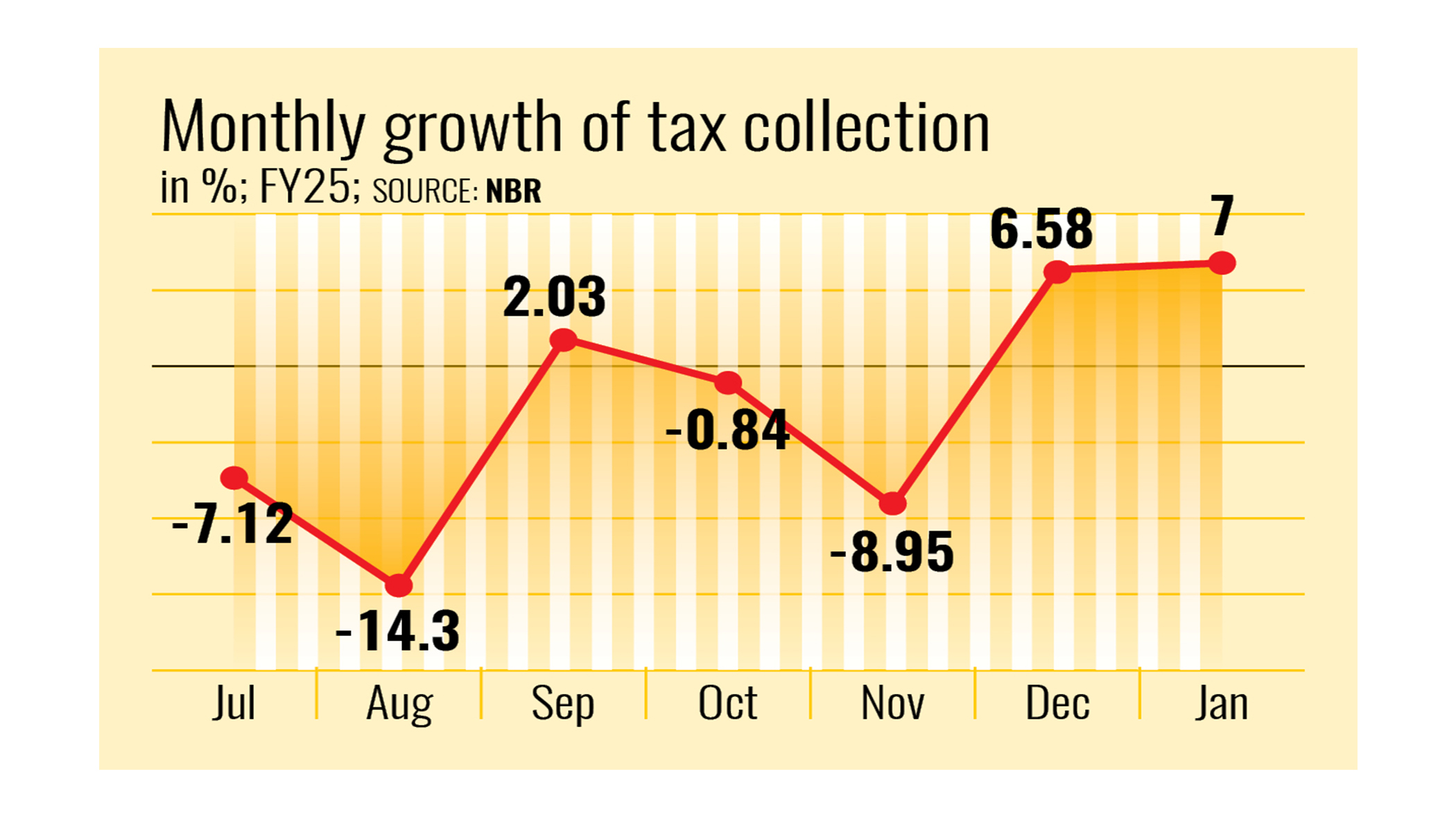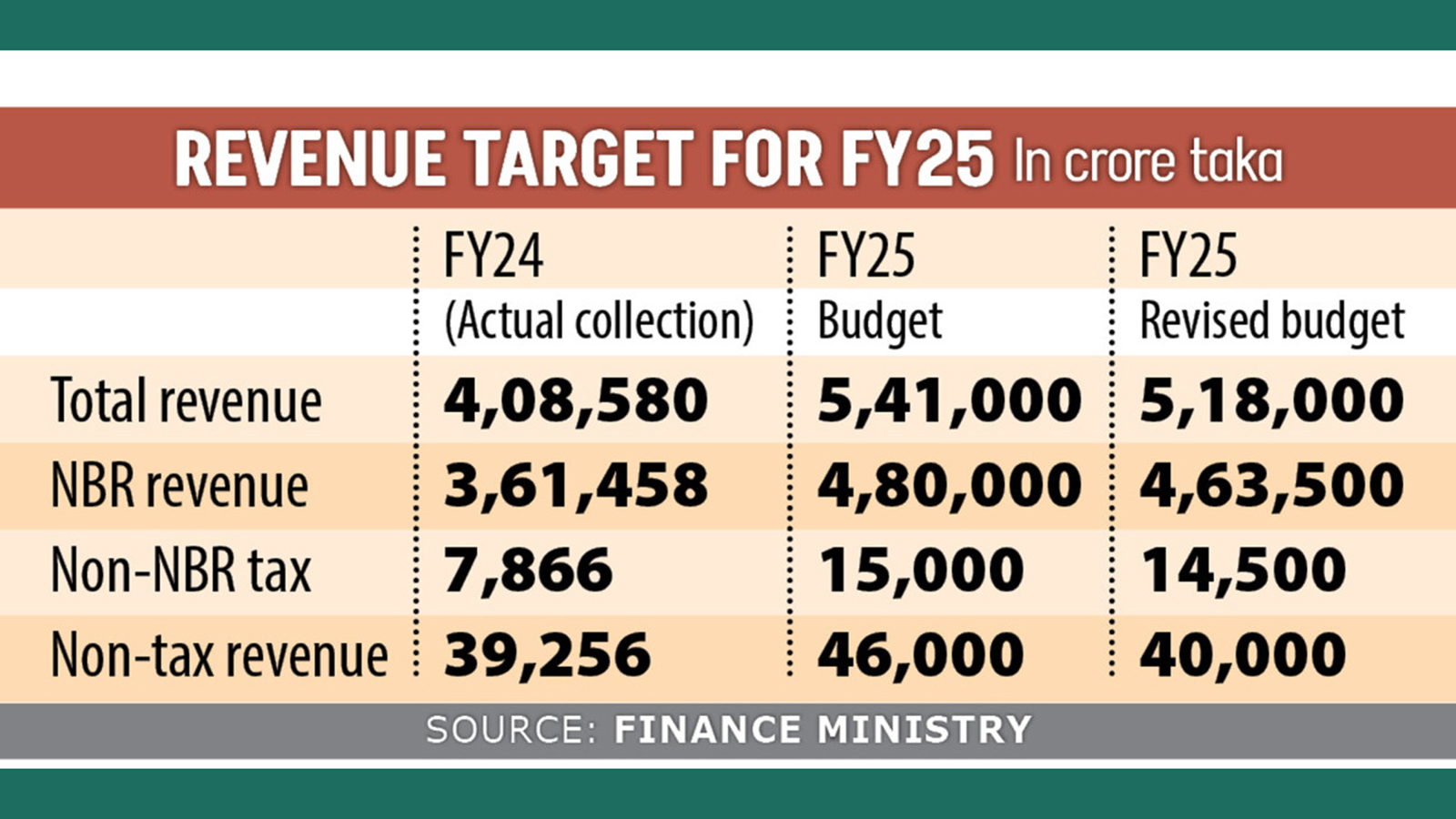With four months left, tax target remains elusive

The tax target for the National Board of Revenue (NBR) has become more daunting against the backdrop of slowing collection as the economy continues to grapple with worsening consumer purchasing power due to stubbornly high inflation and declining private and public investment.
February's data, released by the NBR, showed that revenue collection grew by roughly one percent year-on-year for the month and 1.76 percent in the eight months since the beginning of the fiscal year 2024-25.
Until February, the NBR, which mobilises 86 percent of the state's total revenue, collected Tk 221,817 crore, meeting roughly 80 percent of its target of Tk 280,059 crore for the eight-month period.
With only four months remaining in the fiscal year, the onus is now on the tax authority to collect a further Tk 241,683 crore in order to meet the revised target of Tk 463,500 crore -- a herculean task given the sluggish nature of the economy and looming political uncertainty.
The weak revenue performance has raised concerns that the government will be more reliant on domestic borrowing to finance the national budget as foreign funding declines and debt repayment obligations rise.
"Revenue mobilisation has remained lukewarm, and this chronic underperformance is increasing our dependence on domestic borrowing to finance development expenditure," said Ashikur Rahman, a senior economist at the Policy Research Institute (PRI) of Bangladesh.
"Unfortunately, this is also amplifying our interest payments each year, crowding out private investments.
"It is also essential to note that the IMF is expecting noticeable improvements in revenue mobilisation capacity. Weak reforms on this front will become a point of contention between the Ministry of Finance and the IMF," he added.
The Bangladesh Bank data showed that government borrowing from the banking sector increased by Tk 15,605 crore between July 1 and February 13 this year, an increase compared to the same period a year ago.
Referring to the revenue collection in the first half of FY25, the Centre for Policy Dialogue (CPD) projected earlier this week that total collection would need to increase by a staggering 55.5 percent in the second half of FY25 for the target to be met.
"This is indeed a highly unlikely prospect," the CPD noted, adding that if the current trend of revenue mobilisation continues, the shortfall could reach Tk 105,000 crore by the end of FY25.
Preliminary NBR data showed that customs revenue fell during the July-February period of this year, as Bangladesh's imports, despite recovering from a downturn, still remained low.
Overall imports grew by 3.32 percent year-on-year to $38.11 billion in the July-January period of this fiscal year.
Value-Added Tax (VAT), the largest source of tax revenue, accounting for 38 percent of total NBR-tax, also declined. In the eight months to February, VAT collection fell 3 percent year-on-year to Tk 83,383 crore.
Income tax provided some relief for NBR officials, edging up 4.44 percent in the July-February period.
The revenue board collected Tk 71,914 crore in income tax until February, up from Tk 68,855 crore the year prior.
However, direct tax revenue fell well short of the target.
Selim Raihan, executive director of the South Asian Network on Economic Modeling, said sluggish tax collection in Bangladesh has significant implications for the economy.
"It limits the government's ability to generate revenue for essential public services such as healthcare, education, and various development projects. Without adequate tax income, the government may struggle to meet its spending needs, potentially leading to increased borrowing or a rise in public debt.
"This can harm the country's fiscal stability. Additionally, slower tax collection affects the government's ability to implement social welfare programmes and reduce poverty, hindering efforts to achieve inclusive growth.
"It may also exacerbate income inequality, as the wealthiest individuals and large corporations, who often evade taxes, remain unaffected, while ordinary citizens bear a disproportionate burden."
Raihan, also a professor of economics at Dhaka University, noted that reduced tax revenue can lead to budget shortfalls, resulting in delays or cancellations of critical infrastructure projects that are key drivers of long-term economic development.
"Ultimately, sluggish tax collection can stifle both short-term economic progress and long-term prosperity, affecting the overall stability of the economy."





 For all latest news, follow The Daily Star's Google News channel.
For all latest news, follow The Daily Star's Google News channel. 

Comments